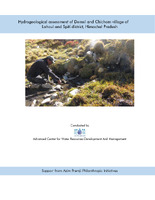Items
Tag
Sustainable livelihoods
-
 Hydrogeological assessment of Demul and Chicham, Spiti The hydrogeological assessment of Demul and Chicham villages in the Spiti Valley, Himachal Pradesh, highlights significant challenges related to water sources amidst climate change impacts. Springs serve as the primary water supply for local communities, providing essential drinking and irrigation water. However, the region has seen a decline in spring discharge due to changes in precipitation patterns, particularly reduced snowfall. This situation has raised concerns about sustainable livelihoods in these villages, prompting an initiative by Ecosphere and ACWADAM to identify potential recharge areas for aquifers that feed these vital springs. The study documented over ten springs in both villages, with water quality testing indicating varying levels of Total Dissolved Solids (TDS) and salinity. While some springs met drinking water standards, others showed elevated pH levels, necessitating further investigation into potential contamination sources. The report suggests implementing recharge structures, such as trenches and percolation pits, in identified recharge zones to enhance groundwater levels. These efforts aim to mitigate the adverse effects of climate change on water availability, ensuring that local communities can maintain their livelihoods in an increasingly unpredictable environment. In conclusion, the delicate ecosystems in the Spiti Valley are facing mounting pressure from climate change, leading to a water crisis that threatens the sustainability of Demul and Chicham villages. With changing snowfall patterns and rising temperatures, proactive measures are essential to secure water supplies through innovative interventions. The collaboration between local communities and organizations like Ecosphere illustrates a commitment to balancing conservation and development, ultimately fostering resilience against ongoing climate challenges while supporting sustainable livelihoods in the region.
Hydrogeological assessment of Demul and Chicham, Spiti The hydrogeological assessment of Demul and Chicham villages in the Spiti Valley, Himachal Pradesh, highlights significant challenges related to water sources amidst climate change impacts. Springs serve as the primary water supply for local communities, providing essential drinking and irrigation water. However, the region has seen a decline in spring discharge due to changes in precipitation patterns, particularly reduced snowfall. This situation has raised concerns about sustainable livelihoods in these villages, prompting an initiative by Ecosphere and ACWADAM to identify potential recharge areas for aquifers that feed these vital springs. The study documented over ten springs in both villages, with water quality testing indicating varying levels of Total Dissolved Solids (TDS) and salinity. While some springs met drinking water standards, others showed elevated pH levels, necessitating further investigation into potential contamination sources. The report suggests implementing recharge structures, such as trenches and percolation pits, in identified recharge zones to enhance groundwater levels. These efforts aim to mitigate the adverse effects of climate change on water availability, ensuring that local communities can maintain their livelihoods in an increasingly unpredictable environment. In conclusion, the delicate ecosystems in the Spiti Valley are facing mounting pressure from climate change, leading to a water crisis that threatens the sustainability of Demul and Chicham villages. With changing snowfall patterns and rising temperatures, proactive measures are essential to secure water supplies through innovative interventions. The collaboration between local communities and organizations like Ecosphere illustrates a commitment to balancing conservation and development, ultimately fostering resilience against ongoing climate challenges while supporting sustainable livelihoods in the region.
